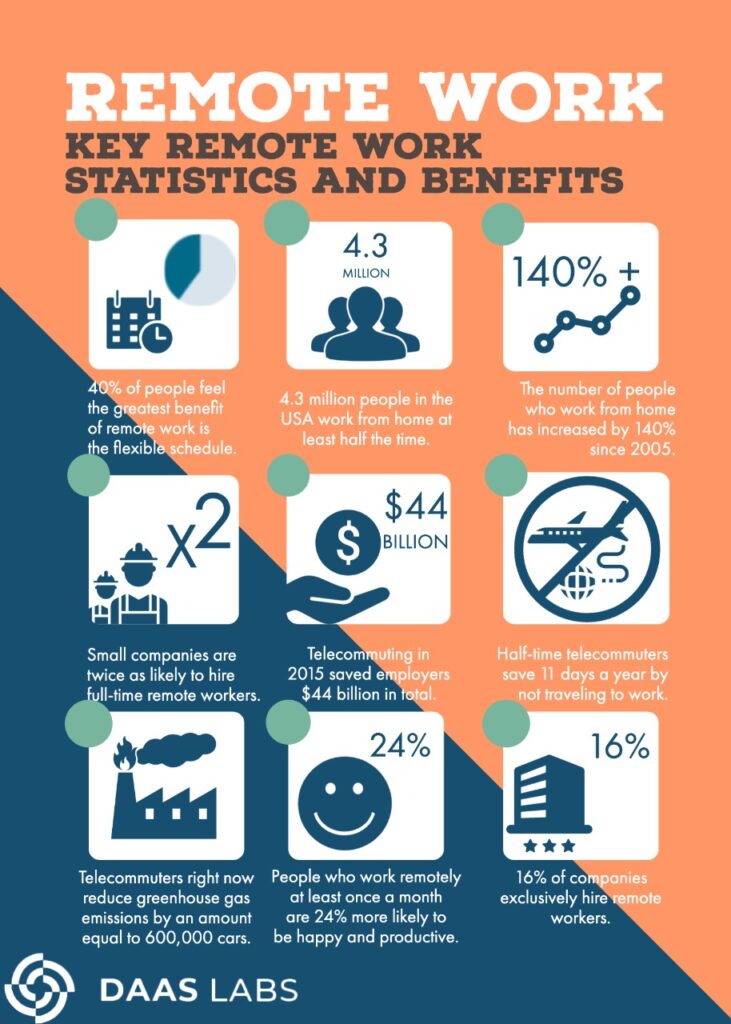As we trudge through this year, the Coronavirus has become “world’s largest work-from-home-experiment”, as quoted by Time. The opportunity to work remotely has become one of the biggest bailouts for many companies. Globally, there is a renewed emphasis on work from home. Giant firms like Microsoft, Amazon, Twitter and several others are advising their employees to stay and work from home.
Remote work is simply not a desirable perk anymore. A massive 74% of respondents in an annual survey believe that flexible working has become the “new normal.”
Obviously, there might be questions like
“What will the workplace look like?”
“How will it affect employee engagement?”
“What will productivity look like if fewer people come to office?”
“What is the employee working on, I couldn’t track them?”
To answer such questions, the remote work stats can spread some light:
- 76% of workers would be more willing to stay with their current employer if they could work flexible hours.
- 40% of people feel that flexible schedule is the greatest benefit of remote work.
- 16% of companies exclusively hire remote workers.
- By 2028, 73% of all departments of U.S. companies will have remote workers as per UpWork’s annual Future Workforce report.
- A research shows that 80% of U.S. workers would turn down a job that didn’t offer flexible working
AT&T reported savings of $30 million a year in real estate alone from their telework initiative.
Trends in Remote Work Growth
An analysis done by Global Workplace Analytics and Flexjobs found that there has been a major upward trend in the amount of people working remotely in the U.S.
- The growth in remote work since 2005 is 159%.
- Between 2016 and 2017 remote work grew 7.9%.
- Over the last five years, remote work grew at 44%.
- Over the last 10 years remote work has grown 91%.
- 4% of the total U.S. workforce are remote workers, up from 2.9% in 2015.
- 7 million of the population in the U.S. currently work from home, up from 3.9 million in 2015.

Employees love remote or flexible work? Numbers tell the story
It’s clear by 2020, remote work stats has shown a sharp increase in number. Some studies shows employees feel flexible working is a clincher when they look out for jobs.
- 78% of the respondents cited flexible schedules and telecommuting as their most effective non-monetary ways to retain employees.
- 85% of respondents confirm that productivity has increased in their business as a result of greater flexibility.
- Over 80% of workers in the survey report that if deciding between two similar job offers, they would turn down the one that didn’t offer flexible working.
- Gallup research found that 54% of office workers would leave their job, if they could have one with more flexibility.
- Two-thirds of employees say that a loss of flexibility would make them start thinking about looking for another job.
- 32% employees state that having a choice of work location would matter more to them than being given a more prestigious role within their company.
- 65% of businesses say flexible workspace helps them reduce capex/opex, manage risk and consolidate their portfolio.
Flexible working can specifically help improve the inclusion of groups that struggle to balance personal and work life such as care-takers, people with mental health issues such as depression, or older workers.
Xerox calculated that it saved 92 million miles of driving by allowing its remote workers to avoid commuting, thereby reducing carbon emissions by almost 41,000 metric tons.
Benefits of Remote Working
As we move forward in 2020 and adjust to a larger remote workforce, let’s see its benefits:
- Coworkers and overall office noise are obviously a big part the distractions. 74% of respondents in a survey report that they work remotely to get away from these interruptions. (source: Flexjobs)
- According to remote work stats, 44% of the companies still don’t allow remote work. But 97% of respondents would love to have a flexible working plan in the long run. This is certainly something companies should consider in their proposals. (source : Flexjobs)
- 77% of people believe remote work improves general health and reduce stress. (source : Flexjobs)
- Companies allowing remote work have 25% lower employee turnover compared to those that don’t. As more and more companies begin to offer remote work as an option, employee satisfaction and loyalty will increase. (source: Owl Labs)
- People who do 50% of their work remotely save an average of $11000 and 11 days per year in travelling alone. Instead of being stuck in traffic, they can use this time productively, in turn, it has a positive effect on employee’s general health and also save their income. (source: Flexjobs)
- Remote work is not only beneficial for the employees and their employers but also for the environment. Telecommuters can reduce pollution there by reducing greenhouse gas and other harmful gas emission.




